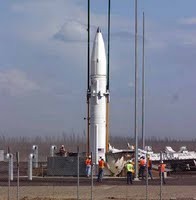On Nov. 23, Russian President Dmitry Medvedev warned NATO that it needs to address Moscow’s security concerns over its plans for European ballistic missile defense (BMD) or face renewed confrontation. Although Medvedev’s declaration, made in a special televised announcement, may have been designed to boost his party’s fortunes in next week’s parliamentary elections, his position is a widely held one within the Russian government. And since he listed a series of demands that, while not unreasonable, cannot be met by NATO governments, the next Russian and American presidential terms will probably see renewed battling over the BMD issue.
Medvedev recalled that he had proposed at last November’s NATO-Russia Council summit a “joint sector-based missile defense system in Europe where every country would be responsible for a particular sector,” adding that Moscow was open to modifying its proposals to meet NATO countries’ concerns. “Our only goal was to preserve the basic principle that Europe does not need new dividing lines, but rather, a common security perimeter with Russia’s equal and legally enshrined participation.”
At the November summit, Medvedev proposed that Russia would defend its territory, as well as the territory of some of its east European neighbors, from missile attacks aimed at any European country. In return, any BMD deployed by NATO would not extend into Russian territory, thereby alleviating Moscow’s fears that NATO’s BMD systems could intercept Russia’s nuclear-armed land-based long-range missiles, the backbone of Russia’s strategic nuclear deterrent and security.

